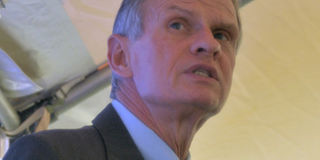Prepare to stand on your own, US ambassador urges Uganda

Ambassador Lanier speaks at his residence in Kololo in Kampala. PHOTO BY YUSUF MUZIRANSA
Uganda should prepare to stand on its own as western economies move to end direct budgetary support in order to focus on addressing the hard economic times back home, US ambassador to Uganda Jerry P. Lanier has said.
Uganda has been receiving large sums of money in direct project support from donor countries, especially from the west. Speaking at an event the embassy organised to think up new approaches and messaging to rein in resurging HIV/Aids infection and prevalence rates on Monday at his residence in Kampala, Mr Lanier said: “We are having a hard time economically back home and so our support will have to come to an end (at some time). It is important that you are prepared to stand on your own [financially], we want to support you but ultimately you will have to stand on your own,” he said.
The US government does not offer budget support to the Uganda government but injects an estimated $600 million (about Shs1.5b) annually into the country. Half of this money is dedicated to HIV/Aids and nearly 80 per cent to the other health sectors. The event drew young people from the media fraternity in an effort to generate new messages to tackle the disease as part of the World Aids Day events.
World Aids Day was commemorated on Thursday. Experts say after three decades, the public seems to have become more complacent and the array of messages that helped change individual behaviour are no longer effective, therefore the need to think of new awareness messages.
The increase of the social media and large younger population requires new approaches to reach it.
Uganda, which registered early leadership in rolling back infection rates, has seen nearly half a decade of stagnation and this year showed resurgence in infection rates.
At least a million Ugandans are known to be HIV positive though a majority does not know their status.
Latest surveys put fishing communities; mobile workers especially truck drivers and commercial sex workers among the most vulnerable.
A higher incidence of infection has also been registered among married couples or people in long-term relationships. Donors fund nearly 30 per cent of Uganda’s annual national budget.



